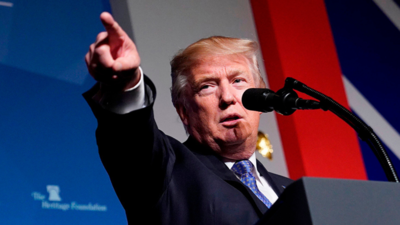
US President Donald Trump is set to sign an executive order officially designating English as the national language of the United States, a move that has sparked both support and criticism.
The order is expected to be signed on Friday, reverses a mandate introduced by former US President Bill Clinton in 2000 that required federal agencies and organisations receiving government funding to provide language assistance to non-English speakers.
For nearly 250 years, the United States has never had an official language, despite English being the primary language used in major documents like the Constitution and the Declaration of Independence. Now, Trump’s order will change that, aligning the US with the 180-plus countries worldwide that have designated official languages.
Under the new policy, federal agencies will have the discretion to decide whether to continue offering
multilingual services
. Critics fear this could create barriers for non-English speakers when it comes to immigration, voter participation, and access to government resources.
The White House has framed the decision as a step towards "unity, efficiency in government operations, and a pathway for civic engagement." It also argues that the order will celebrate multilingual Americans who have learned English while encouraging immigrants to adopt the language to achieve the "American dream."
However, advocacy groups have strongly opposed the move. Vanessa Cárdenas, executive director of America’s Voice, an immigration reform organisation, said:
"This isn’t just an offensive gesture that sticks a thumb in the eye of millions of US citizens who speak other languages, but also will directly harm those who have previously relied on language assistance for vital information."
The change could also affect citizenship applications and voting access. Currently, some applicants can take the naturalisation test in their native language if they meet certain residency and age requirements. Activists warn that removing multilingual resources could make it harder for people to become citizens.
Anabel Mendoza of United We Dream, an immigrant advocacy group, said the order sends a clear message: "Trump is trying to send the message that if you’re not white, rich, and speak English, you don’t belong here."
Groups like APIAVote also argue that the policy will create barriers for elderly naturalised citizens and minority communities who may struggle to access vital services, from healthcare to economic aid.
Some critics have also raised concerns about how the executive order might affect US territories such as Puerto Rico, where Spanish is the dominant language.
More than 30 US states have already designated English as their official language. Hawaii is the only state with two official languages—English and Hawaiian.
Efforts to make English the national language at a federal level have been introduced in Congress multiple times over the years, but none have passed. The most recent attempt came in 2023 when Senators Kevin Cramer and JD Vance introduced the English Language Unity Act.
Trump has previously signalled his support for such a policy. At the 2024 Conservative Political Action Conference (CPAC), he said: "We have languages coming into our country. We don’t have one instructor in our entire nation that can speak that language. It’s the craziest thing... It’s a very horrible thing."
Since returning to office in January, Trump has signed at least 76 executive orders. Among them, he has renamed the Gulf of Mexico to the "Gulf of America" and restored Mount McKinley’s name after it was changed to Denali under President Barack Obama.
The move to make English the official language is expected to face legal and political challenges.

 1 month ago
13
1 month ago
13









 English (US) ·
English (US) ·